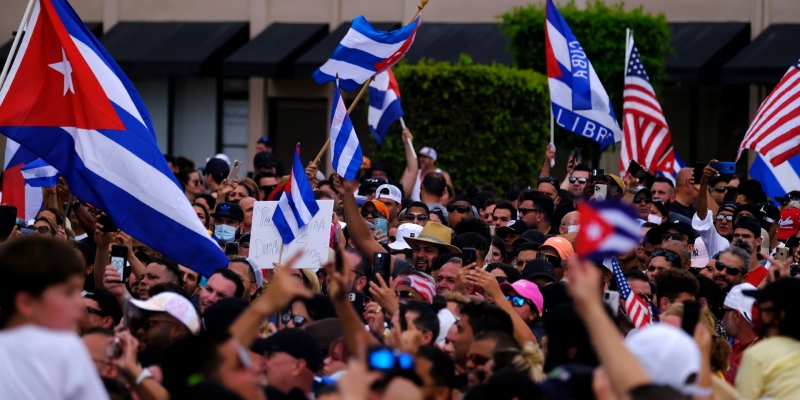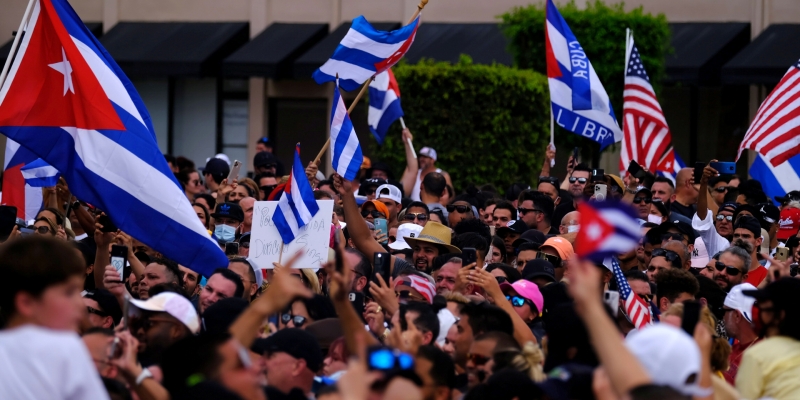AboutCubans asked by RBC reported that there are problems with food and medicines in the country. According to them, the population is opposed to the communist system, believing that Cuba lacks the foundations of rights and freedoms

Residents of Cuba told RBC why mass anti-government protests began in the country.
“Now in Cuba there are big problems with food, medicines, huge queues. I recently went there and was horrified. It is impossible to buy anything other than medicines for coronavirus, even elementary antiparasitic and painkillers. People are tired of this & mdash; from the fact that the government blames the blockade for all the troubles»,— Cuban citizen Yeslandi Gilarte told RBC.
According to him, this situation has been observed in the country for 60 years. He noted that people demand freedom of expression and civil rights. “The last time I contacted my father was yesterday, then the Internet in Cuba disappeared. I have several oppositional friends, I think they also went to the actions, ” he added.
Video
A citizen of Cuba, Sandi, in an interview with RBC, said that the inhabitants of the country are opposed to the communist system and the lack of the most necessary products, medicines, as well as the lack of even basic rights and freedoms. “My friends and relatives came out to the actions in different parts of [the province] Pinar del Rio, Holguin, Camaguey. But I can’t withthey can be contacted— since yesterday there is no internet in Cuba. For the last three weeks, my relatives have been living in terrible conditions. They suffer from lymphangitis-it can be cured with a couple of penicillin tablets, but it is impossible to buy medicines, only on the black market for dollars and euros. But there is also no way to buy dollars and euros, ” she said.
According to the interlocutor of RBC, now her grandmother is in one of the hospitals in Camaguey. “She went blind because she has diabetes and lymphangitis, which caused her sugar levels to rise. We can’t buy insulin either. My relative’s children suffer from scabies. People have to choose: buy a pound of rice or three pills for fever. It’s just terrible, ” she said.
As Sandi noted, before the pandemic, medicines could be bought at least for the national currency, the state reimbursed part of the cost. “And we could get medicines, although we had to wait in line for three days to do this. Now only on the black market, ” she added.
A relative of the protesters, Zuriel Gonzalez, in a conversation with RBC, said that they take an active part in the actions, but it is very difficult to communicate with them. “Since yesterday, there is no Internet in Cuba, you can only connect via a VPN, which not everyone knows how to do,” he said.
According to him, the protests took place on Sunday, July 11, and continued on the morning of July 12. “Yesterday, my cousin’s husband and his brother were at a demonstration in Cienfuegos. My sister’s husband was walking with the US flag-because we consider the US to be our allies in the fight against the regime. The police attacked them, they tried to protect themselves, now there is no connection with them. Today, several of my friends are going to a protest rally in Camaguey. They are in favor of freedom of speech, they are against the fact that there is no free media in Cuba, ” Gonzalez said.
The protests against the Cuban government began last weekend. They were caused by the economic crisis, interruptions in the supply of electricity and food, as well as against the health system, which, according to the protesters, cannot cope with the COVID-19 pandemic. The first performances began in the city southwest of Havana, San Antonio de los Banos, then they spread to other localities, including the capital.
In response to the protests, President Miguel Diaz-Canel called on “revolutionaries and communists” to take to the streets and resist possible provocations during the protests. On the state TV channel of Cuba, instead of protest actions, rallies for the communists were shown.
The current protests, as well as the situation in the Cuban economy, reminded many analysts of the period following the collapse of the USSR, when Moscow stopped providing generous financial support to the country. In 1994, thousands of protest marches were constantly held on the island, after which one of the mass waves of emigration to the United States began.
RBC on Twitter Instant news and videos on our Twitter

